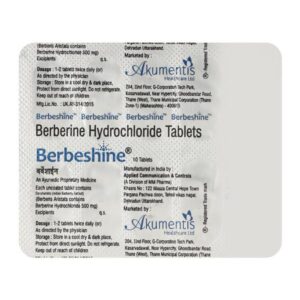BERBERINE
BERBERINE: Berberine is an alkaloid compound derived from certain plants such as Berberis vulgaris (barberry) and Coptis chinensis (goldthread). It has been used for centuries in traditional Chinese and Ayurvedic medicine to treat various ailments.
Berberine has a variety of potential uses and health benefits. It has been studied for its role in improving blood sugar control and insulin sensitivity, making it particularly useful for individuals with type 2 diabetes or prediabetes. It may also help lower cholesterol levels, support weight loss, and improve digestion. Additionally, berberine has antimicrobial properties and may be effective against certain bacteria, fungi, and parasites.
The exact mechanism of action of berberine is not fully understood. It is thought to activate an enzyme called AMP-activated protein kinase (AMPK), which plays a key role in regulating cellular energy metabolism. By activating AMPK, berberine enhances glucose uptake in cells, promotes the breakdown of fats, and inhibits the production of glucose in the liver.
The recommended dose of berberine varies depending on the condition being treated. For diabetes and blood sugar control, a typical dose is 500 mg to 1500 mg per day, divided into two or three doses. For cholesterol management, doses of 500 mg to 2000 mg per day have been used. However, it is important to consult a healthcare professional to determine the appropriate dosage for your specific situation.
Like any medication, berberine can have side effects. Common side effects may include gastrointestinal symptoms such as diarrhea, constipation, abdominal pain, and bloating. It may also have an interaction with certain medications, including those metabolized by the cytochrome P450 enzyme system. Therefore, it is important to inform your healthcare provider about all medications you are taking before starting berberine.
Berberine may also interact with other supplements or herbs with similar mechanisms of action. It is important to exercise caution when combining berberine with other glucose-lowering medications or cholesterol-lowering drugs to avoid potential adverse effects.
It is worth noting that berberine is generally considered safe when used as directed, but it is always important to consult with a healthcare professional before starting any new medication or supplement.

